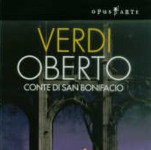Verdi’s first opera, Oberto, Conte di San Bonifacio (1839), is a genuine rarity, seldom performed onstage. The score is full of catchy arias, choruses, and especially duets and trios that you forget almost immediately, but the opera is truly sunk by a dumb story. Count Riccardo (tenor) had earlier seduced Leonora (soprano), the daughter of his friend Count Oberto (baritone). Now he is about to marry Cuniza (mezzo-soprano), but a still-angry Oberto convinces Leonora to tell Cuniza about the seduction. Cuniza, appalled, insists that Riccardo marry Leonora. Oberto, angry as usual, challenges Riccardo to a duel. Oberto is killed, Riccardo is exiled, Leonora decides to enter a nunnery, and I can’t recall what happens to Cuniza. Characters enter, sing, and leave, and in the mouths of great singers, the music–especially the florid lines for the two women–can be quite enjoyable.
As you might expect, this is the only DVD of Oberto available, recorded in Bilbao in 2007, and as such it has intrinsic value. A Gothic gloom pervades all, rather minimally but effectively; the period costumes (13th century) are attractive. (Domenico Franchi is the designer.) Director Ignacio Garcia keeps movement simple but directs the father/daughter scenes sensitively, as if foreshadowing the Gilda/Rigoletto and Germont/Violetta relationships. The arias owe a great deal to Donizetti in their bel canto tendencies, but some of the singers here enjoy volume more than subtlety.
Carlo Ventre as Riccardo has an appealing, largish tenor (he’d make a good Don José), which he uses unsparingly, and though his acting is rudimentary, his involvement somehow wins the day. As his friend/enemy Oberto, bass Ildar Abdrazakov has a very impressive sound and he correctly takes over every scene he’s in by voice alone–he’s a stand-up-and-sing guy. He brings down the house with his second-act cabaletta. Evelyn Herlitzius, with more of a wobble in her voice than a soprano her age should have (her other roles include Brünnhilde, Salome, and Isolde), is nonetheless a fine artist and actress and she brings great feeling to the role of Leonora. (The none-too-delicate, late soprano Ghena Dimitrova sings the role on the Orfeo recording under Lamberto Gardelli; the similarly undainty Maria Guleghina is Leonora on Philips, so maybe it’s a trend.) Marianne Cornetti handles the high-lying mezzo role of Cuniza well and she makes a good case for the part in general.
In fact, if you do not analyze the singing throughout too heavily, the whole cast does well, and their sense of ensemble might convince a listener of the quality of this opera. Yves Abel leads the Orquesta Sinfónica del Principado de Asturias in a rough and ready performance. Recommended for completists and the curious, but the audio-only Orfeo recording is best of all.
































